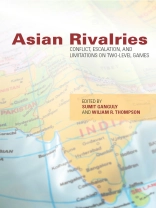The most typical treatment of international relations is to conceive it as a battle between two antagonistic states volleying back and forth. In reality, interstate relations are often at least two-level games in which decision-makers operate not only in an international environment but also in a competitive domestic context.
Given that interstate rivalries are responsible for a disproportionate share of discord in world politics, this book sets out to explain just how these two-level rivalries really work.
By reference to specific cases, specialists on Asian rivalries examine three related questions: what is the mix of internal (domestic politics) and external (interstate politics) stimuli in the dynamics of their rivalries; in what types of circumstances do domestic politics become the predominant influence on rivalry dynamics; when domestic politics become predominant, is their effect more likely to lead to the escalation or de-escalation of rivalry hostility? By pulling together the threads laid out by each contributor, the editors create a ‘grounded theory’ for interstate rivalries that breaks new ground in international relations theory.
Sobre o autor
Sumit Ganguly holds the Rabindranath Tagore Chair in Indian Cultures and Civilizations at Indiana/Bloomington. William R. Thompson is Distinguished Professor & Donald A. Rogers Professor of Political Science at Indiana/Bloomington.












